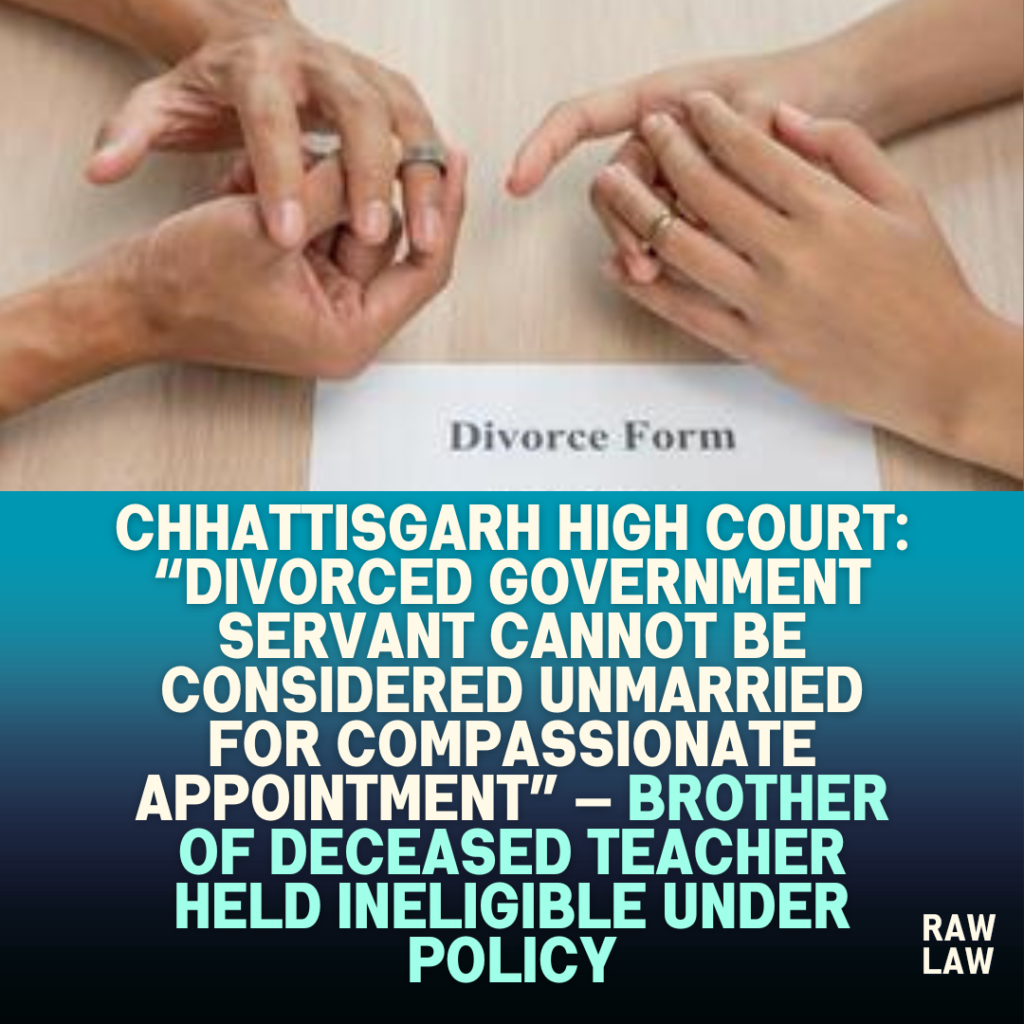Court’s Decision
The Chhattisgarh High Court dismissed the writ appeal filed by the appellant challenging the rejection of his claim for compassionate appointment. The Division Bench comprising Chief Justice Ramesh Sinha and Justice Bibhu Datta Guru upheld the order of the Single Judge, stating:
“On a plain reading of order, we do not notice any such palpable infirmity or perversity, as such, we are not inclined to interfere with the impugned order.”
The Court ruled that since the deceased was a divorced lady, she could not be treated as “unmarried” for the purpose of availing benefits under Clause 6 of the Compassionate Appointment Policy, and hence her brother was not entitled to claim appointment.
Facts
The appellant’s sister, who was employed as a Teacher Panchayat after her initial appointment as Shikshakarmi, passed away on 24.09.2018. She was a divorced woman and had no children. Following her death, her sister-in-law applied for a compassionate appointment, which was rejected due to ineligibility. Subsequently, the appellant, her brother, submitted an application on the basis of a recommendation from their mother under Clause 6 of the Policy on Compassionate Appointment. However, his application was rejected on the ground that a divorced government employee could not be treated as “unmarried”, thereby rendering the appellant ineligible under the policy. The appellant’s writ petition challenging the rejection was also dismissed by the learned Single Judge, prompting the present intra-court appeal.
Issues
- Whether the term “unmarried” in Clause 6 of the Compassionate Appointment Policy includes a “divorced” government servant?
- Whether the appellant, as the brother of a deceased divorced government servant, is entitled to compassionate appointment?
Petitioner’s Arguments
The appellant contended that a divorced person should be considered as “unmarried” for the purposes of Clause 6. It was argued that post-divorce, the only right a spouse retains is that of maintenance, and therefore, there is no marital relationship in existence. The appellant emphasized the financial distress faced by the family and highlighted that the deceased was the sole breadwinner, with the mother being financially dependent and not receiving any pension. The appellant also relied on Section 21 of the Hindu Adoptions and Maintenance Act, asserting that the mother and brother fall within the definition of “dependents”. He cited the Supreme Court decision in X v. Principal Secretary, Health and Family Welfare Department, to argue for a broader and compassionate interpretation.
Respondent’s Arguments
The State opposed the appeal, asserting that the learned Single Judge had rightly interpreted the provisions of the Compassionate Appointment Policy. The circular dated 14.06.2013 explicitly lists eligible relatives, and the appellant, being the brother of a divorced sister, did not fall within that category. It was also argued that compassionate appointment is a matter of policy and must be strictly construed. No deviation can be made from the policy framework unless expressly provided for.
Analysis of the Law
The High Court analyzed Clause 6 of the Circular dated 14.06.2013, which provides for compassionate appointment in cases involving the death of an “unmarried” or “widower” government servant with no children. It notes that eligibility is restricted to the brother or sister upon recommendation of the parent in such cases. However, the deceased in this case was a divorcee and not an “unmarried” person within the meaning of the policy. The Court emphasized that policies related to compassionate appointments must be strictly interpreted, as they are not a matter of right but of discretion governed by policy.
Precedent Analysis
The Court referred to the following judgment:
- Canara Bank v. Ajithkumar G.K., Civil Appeal No. 255 of 2025 (2025 INSC 184)
The Supreme Court reiterated that compassionate appointment cannot be claimed unless explicitly provided for in the policy. It held that deviation from the terms of policy, either by addition or subtraction, is impermissible.
The Court distinguished the appellant’s reliance on X v. Principal Secretary, Health and Family Welfare Department, observing that it did not override the necessity for compliance with policy norms governing compassionate appointment.
Court’s Reasoning
The Court held that the interpretation of “unmarried” cannot be extended to include “divorced” individuals merely by implication. It reaffirmed the principle that:
“Compassionate appointment cannot be claimed in absence of any specific provision made in the policy, as it is a matter of policy of the employer and such employer cannot be compelled to make compassionate appointment contrary to its policy.”
The Court also emphasized that the legality of the policy itself was not under challenge, and therefore, its terms must be applied as they stand.
Conclusion
The Division Bench found no infirmity in the reasoning or findings of the learned Single Judge. The policy was clear, and no eligibility could be conferred on the appellant in the absence of an explicit provision. The writ appeal was therefore dismissed with no order as to costs.
Implications
This judgment reaffirms the legal principle that compassionate appointment is not an enforceable right but a policy-based benefit, which must be strictly construed. It clarifies that the term “unmarried” in compassionate appointment schemes cannot be interpreted to include “divorced” individuals, unless the policy expressly states so. It also affirms the limits of judicial intervention in policy matters unless the policy itself is under constitutional challenge.
Also Read: Gujarat High Court Dismisses Second Appeal Challenging Eviction Order



